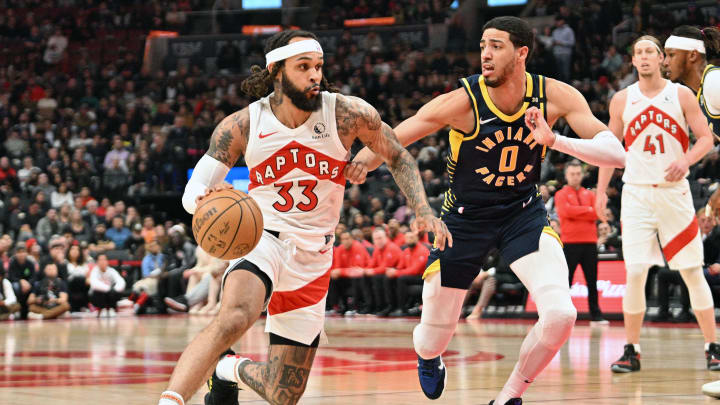Raptors Free Agency: A Look At Toronto's Cap Flexibility & Gary Trent Jr.'s Future

It'll be another quiet free agency for the Toronto Raptors this summer.
At this point, it should come as no surprise. Toronto has not entered free agency as a cap space team since 2015 when the organization inked DeMarre Carroll to a four-year, $60 million contract. Since then, Toronto has stayed pretty quiet, failing to sign a free agent of note in almost a decade.
That won't change this year.
With Bruce Brown's $23 million option for next season now on the books, the Raptors will once again enter free agency without cap space to do any serious shopping.
Guaranteed Contracts
Toronto has at least $158 million in guaranteed contracts committed to next season across 12 players including rookie first-round pick Ja'Kobe Walter. That doesn't include Toronto's three second-round picks of which Jonathan Mogbo and Jamal Shead are expected to receive at least some guaranteed money. That figure also only includes the $100,000 guaranteed portion of Javon Freeman-Liberty's contract for next season which is partially guaranteed for a total of $1.9 million.
Quickley's Contract
Toronto will reportedly sign Immanuel Quickley to a five-year, $175 million contract once contracts are allowed to officially be signed on July 6. What's unclear is how the Raptors plan on structuring that contract.
If the Raptors want to escalate Quickley's contract, his cap figure for next season could be as small as $30.2 million for next season. With $2.4 million raises in each season, Quickley's contract would max out at $39.8 million in 2028-29 with an average annual value of $35 million.
There are, however, some other options for Toronto.
The Raptors could opt to pay Quickley $35 million each season. That would increase Toronto's committed salary for next season by $4.8 million but would allow the Raptors to create extra flexibility in 2027 and 2028 when Barnes' contract will be more cost-prohibitive and Toronto figures to have a team closer to contention.
The other option would be to frontload Quickley's contract with a starting figure at $35.3 million, the maximum he's allowed for next season. Toronto could increase that figure to $38.1 million in 2025 before decreasing it in each of the following seasons to a figure as small as $33.3 million in 2028-29.
Cap Holds
Gary Trent Jr.'s cap hold is the biggest for Toronto this summer at $27.8 million. That number will sit on the Raptors' books until Trent re-signs, signs elsewhere, or Toronto elects to renounce his cap hold.
Toronto also has smaller cap holds of $5.7 million for Jordan Nwora, $2.1 million for Garrett Temple, and $1.9 million for Malik Williams.
The Raptors could have taken advantage of Quickley's $12.5 million cap hold for next season had Toronto opted to enter free agency as a cap space team without Brown. Considering Toronto won't be a cap space team, Quickley's cap hold doesn't really matter.
Luxury Tax Threshold
The big number to pay attention to is the luxury tax threshold of $171.3 million for next season. That'll essentially be a hard cap for Toronto as the organization isn't going to pay into the luxury tax for a team that's not expected to be competitive.
Mid-Level Exception
Toronto will have access to the non-taxpayer mid-level exception to sign free agents this summer. That would allow the Raptors to sign one or more players to contracts totaling up to $12.9 million for next season. The maximum allowable contract on the mid-level exception is a four-year, $55.3 million deal.
Last season, for example, Toronto used its mid-level exception to sign Dennis Schröder to a two-year deal. The year before, the Raptors used the mid-level exception to sign Otto Porter Jr.
Financial Space
While Toronto does have access to the non-taxpayer mid-level exception, the Raptors likely won't be able to use the full mid-level exception without dipping into the luxury tax.
If Quickley's contract for next season is at the smallest possible figure, Toronto could have about $13.3 million to sign its second-round picks, add minimum signings, and use whatever is left as part of its mid-level exception.
Toronto will likely make at least one addition in free agency this summer, but it's not going to be a big one and considering the Raptors track record when it comes to free agency additions, it's probably wise to temper expectations.
Trent's Future
It looks like Trent will likely be heading elsewhere next season.
Considering Toronto is unlikely to be able to use the full mid-level exception this summer, it'd be shocking if Trent re-signed. The Raptors won't be able to offer him anywhere close to the $18.6 million he made last season without going into the luxury tax and even a substantial pay cut would be too much for Toronto to afford.
Between Toronto's decision to pick up Brown's option and the Raptors' willingness to take on salary in their Thursday trade with the Sacramento Kings, it seems like the organization is content to let Trent walk in free agency.
